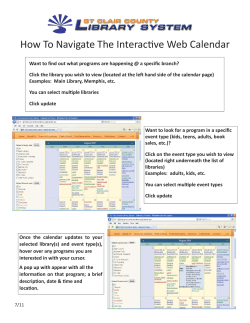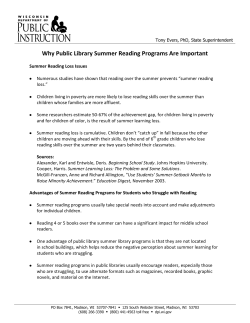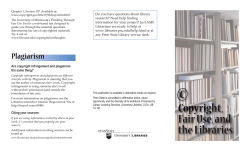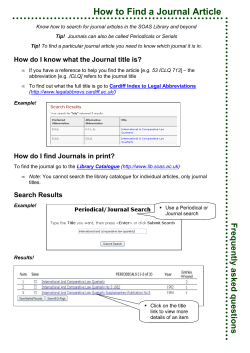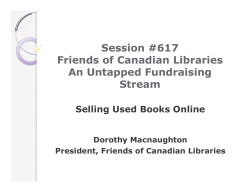
How to Research a Legal Problem: A Guide for Non-Lawyers
How to Research a Legal Problem: A Guide for Non-Lawyers guide is intended help a personwith witha alegal legalproblem problemfind findlegal legalrules rules that that can can resolve resolve ThisThis guide is intended to to help a person ororprevent conflict. It is most useful to work through the steps prevent conflict. It is most useful to work through the steps and sources sources in in the the order order given. For a web version of this guide, see www.aallnet.org/sis/lisp How to Research a Legal Problem: A Guide for Non-Lawyers GETTING STARTED GETTING STARTED State the question clearly that you need to answer. State the question clearly that you need to answer. Determine the jurisdiction, meaning the particular subject and locality. You must first determine which Determine the jurisdiction, the particular subject locality. legal You must first determine which court court or government agencymeaning can resolve the conflict beforeand beginning research. or government agency can resolve the conflict before beginning legal research. Understand citations and abbreviations. Most law books are cited in the order of volume number, book, Understand citations and410abbreviations. lawvolume books are in theStates order ofReports, volume page number, and and page. For example, U.S. 113 wouldMost signify 410cited of United 113.book, Statutes are cited statute410 titleU.S. and113 section such as410 42 U.S.C. § 1983 for title 42 United States Code, are page. For by example, wouldnumber, signify volume of United States Reports, page 113. Statutes section Many thesection abbreviations encounter explained in the textStates of thisCode, pamphlet. cited by 1983. statute title of and number, you suchwill as 42 U.S.C. §are 1983 for title 42 United section 1983. Most of the abbreviations you will encounter are explained in the text of this pamphlet. WHERE TO GO WHERE TO GO Public libraries will have at least some of the codes, texts, and self-help materials mentioned here, as well as facilities for internet access. Public libraries will have at least some of the codes, texts, and self-help materials mentioned here, as well as Most county, court, access. or law school libraries are open to the public and contain all the resources talked facilities for internet about here. Internet access for the public will vary across libraries of this type. Most county, court, or law school libraries are open to the public and contain all the resources talked about Depository of the federal materials located at most lawtype. libraries, larger public libraries and here. Internetlibraries access for public will varyare across libraries of this universities, and are required to be available to the public. Increasingly, the federal government has made many of its depository and other publications available on the Web through the GPO’s Federal Digital Depository libraries of federal materials are located at most law libraries, larger public libraries, and System (FDsys) at www.gpo.gov/fdsys/. These and other law libraries will have various guides to help universities and areinformation required to be locate government onavailable the Web.to the public. Increasingly, the federal government has made many of its depository and other publications available on the web at www.gpo.gov/fdsys. These and other law havea comprehensive various guides tosource help locate government the web.points for legal Thelibraries Internetwill is not for legal material.information Some goodonstarting information on the Web: The Legal Information Institute, www.law.cornell.edu; FindLaw, www.findlaw. com;internet WashLaw: Legal Research on the Web, American Association’s Public The is not a comprehensive source forwww.washlaw.edu; legal material. SomeThe good startingBar points for legal information Resources www.abanet.org/public.html; Public Library of Law, www.plol.org; Google Scholar, scholar. on the web page, include: google.com; theInformation Law Library of Congress’s Guide to Law Online, www.loc.gov/law/help/guide.php; and • The Legal Institute, www.law.cornell.edu HG.org, www.hg.org. Lexis Web at lexisweb.com offers free Google-style searching of legal material. • FindLaw, www.findlaw.com • • • • • WashLaw: Legal Research on the Web, www.washlaw.edu The American Bar Association’s Public Resources page, www.abanet.org/public.html HierosGamos, www.hg.org Public Library of Law, www.plol.org LexisOne, www.lexisone.com 1 How to Research a Legal Problem: A Guide for Non-Lawyers WHAT TOLOOK LOOKAT AT WHAT TO Self-help books or kits containing instructions and forms are available in many bookstores and public Self-help books or from kits containing are available many bookstores and public libraries and even some courtinstructions clerks and and legalforms aid offices to helpin non-lawyers with routine matters. libraries andoreven from cover some court clerks and legaltraffic aid offices to wills, help non-lawyers with routinelandlord-tenant matters. The books kits may divorce, bankruptcy, tickets, contracts and leases, The books or kits may cover divorce, bankruptcy, wills, contracts leases, agreements, small business matters, and manytraffic othertickets, legal subjects. Usuallyand written by landlord-tenant lawyers, such books may save patron matters, hours of and research. self-help information available on Websuch sites such as agreements, smallthe business many Some other legal subjects. Usually is written by lawyers, books www.LawHelp.org and www.nolo.com. may save you hours of research. Some self-help information is available on websites such as Nolo Press at www.nolo.com. Practice aids and form books are intended for lawyers, but can be useful for anyone. Some examples of practice aids are Causes of Action, American Jurisprudence Trials, and American Jurisprudence Proof of Practice aids and form books are intended for lawyers, but can be useful for anyone. Some examples of Facts, which give guidance in what evidence a court must be given and how to proceed. Form books aid practice aids are Causes of Action, American Jurisprudence Trials, and American Jurisprudence Proof of Facts, in drafting legal documents or documents that need to be filed in court. State form books are available for which give guidance whatbooks evidence a court must beJurisprudence given and howLegal to proceed. booksJurisprudence aid in drafting most states. Generalinform include American Forms,Form American legal documents or documents that need to be filed in court. State form books are available for mostare states. Pleading and Practice Forms, West’s Legal Forms, and West’s Federal Forms. While some forms General include American Jurisprudence Legal Forms, many American Pleading availableform freebooks on the Web, such as those at forms.findlaw.com, sitesJurisprudence will ultimately chargeand a fee. We Practice Forms, West’s Legal Forms, and West’s Federal Forms. While some forms are available free onmay be recommend that you try your nearest law library first. Also, forms for particular court procedures the web, such at www.lexisone.com many sites ultimately a fee. It available fromas thethose court’s clerk’s office. See,(see e.g.,Forms links link), for your state or will jurisdiction at charge www.washlaw.edu. is recommended that you try your local court and nearest law library first. See, e.g. links for your state or Legal encyclopedias are a good starting point to get an overview of a topic. There are two general legal jurisdiction at www.washlaw.edu. encyclopedias: Corpus Juris Secundum (C.J.S.) and American Jurisprudence 2d (Am. Jur. 2d). Many states also encyclopedias statestarting law. Begin theanindex and look for different synonyms of your Legalhave encyclopedias are aofgood pointwith to get overview of a topic. There are two general legalterm. The text will contain many footnotes leading to further sources. encyclopedias: Corpus Juris Secundum (C.J.S.) and American Jurisprudence 2d (Am. Jur. 2d). Many states also have encyclopedias of state law. Begin with the index and look for different synonyms of your term. The text will Texts and treatises can also yield useful general information. They contain the law on a specific subject, contain manya footnotes leading to further sources. sometimes specific jurisdiction, and may include forms. The briefest are those in West Publishing Co.’s Nutshell Series. West’s Hornbooks or comparable publications provide more depth. Multi-volume Texts and treatises canpresent also yield useful generalinformation information.for They contain the law on a specific subject, encyclopedic treatises comprehensive many subjects. sometimes a specific jurisdiction, and may include forms. The briefest are those in West Publishing Co.’s Nutshell Series. Hornbooks comparable publications provide or more Multi-volume encyclopedic Articles printedWest’s in journals or laworreviews published commercially by depth. law schools or bar associations may alsopresent be useful. Look for your subject infor printed computer indexes such as Index to Legal Periodicals treatises comprehensive information manyor subjects. or Legal Resource Index (Legal Trac). Many articles may be found online for free at sites such as Google Scholar, printed Jurist’s in Law Reviews page at jurist.law.pitt.edu/lawreviews/ University Review Project Articles journals or law reviews published commercially or byand lawthe schools or barLaw associations may at www.lawreview.org. The dates of full-text coverage and level of searchability will vary. Author searches also be useful. Look for your subject in printed or computer indexes such as Index to Legal Periodicals or Legal using search engines like google.com can sometimes lead to free copies of a legal expert’s articles. Resource Index (Legal Trac). Some articles may be found online for free at sites such as Jurist’s Law Reviews page at http://jurist.law.pitt.edu/lawreviews and the University Law Review Project at www.lawreview.org. The Codes contain legal rules known as statutes, regulations or ordinances which are mandatory, meaning that dates full-text coverage and level searchability will an vary. Author using engines like Google courtsofmust follow them. Codes areofaccessed through index thatsearches refers you to asearch numbered section. They can sometimes lead to free copies of a legal expert’s articles. are updated by supplements or pocket parts or are in looseleaf form. Codes contain legal rules statutes, or ordinances, which mandatory, meaning that Most public libraries and known all lawas libraries willregulations, contain a copy of the local stateare code, which holds the laws courts must follow legislature. them. Codes They are accessed through an index that ordinance refers you to a numbered section. They are made by a state’s may also have city or county codes and codes of state administrative agency regulations. Mostorstate some form. local law can be found on the Web by going to a updated by supplements or pocket parts are inand looseleaf state’s official site and looking for links to law and local government (or cities and counties). Sites such as at www.washlaw.edu willallalso to states’ government Most public libraries and law lead libraries will contain a copy ofsites. the local state code, which holds the laws made by a state’s legislature. They may also have city or county ordinance codes and codes of state administrative agency regulations. Most state and some local law can be found on the web by going to a state’s official site and looking 2 How to Research a Legal Problem: A Guide for Non-Lawyers One of the following federal code versions used if the is federal: The United States for links to law and local government (or citieswill andbecounties). Tryjurisdiction using the URL www.state.xx.us, where “xx” Code is the (U.S.C.), United States Code Annotated (U.S.C.A.) or United States Code Service (U.S.C.S.). The U.S.C. is state’s postal abbreviation. Sites such as www.washlaw.edu will also lead to states’ government sites. available at uscode.house.gov, FDsys, and www.law.cornell.edu/uscode. For pending and new federal laws, you’ll probably need to check Congress.gov, the government website for legislative information. Regulations One of theagencies following are federal code versions will be if the jurisdiction(C.F.R.), is federal: UnitedatStates Code (U.S.C.), of federal contained in the Code of used Federal Regulations available United States Code Annotated (U.S.C.A.), or United States Code Service (U.S.C.S.). The U.S.C. is available on the www.ecfr.gov. web at http://uscode.house.gov, although other sites containing the U.S.C., e.g. www.law.cornell.edu/uscode, may provide easierthe ways to locateby a particular statute.must For pending federaland laws, probably need Court rules state procedure which a dispute make itsand waynew to court howyou’ll the resolution of the to checkisThomas, the government for legislative information, http://thomas.loc.gov. Regulations offor dispute to be conducted. Court website rules address such topics as time at limitations and formal requirements pleadings and other court documents or processes. procedural can also be found in statutory federal agencies are contained in the Code of Federal Although Regulations (C.F.R.) atlaw www.gpoaccess.gov/cfr/index.html. and administrative codes, court rules are generally more detailed and can vary from court to court. You may wish ask astate law the librarian for help locating court rules your its court not and posthow them its Web site. Courttorules procedure by which a dispute mustifmake waydoes to court theonresolution of the dispute is to be conducted. Court rules address such topics as time limitations and formal requirements for Reports or reporters contain opinions (sometimes called decisions or cases) written by courts to explain pleadings and other court documents or processes. Although procedural law can also be found in statutory and how and why certain legal rules were used to resolve the dispute in a particular lawsuit. These rules administrative codes, court rules are generally more detailed and can vary from court to court. You may wish to constitute the “common law” and are followed by courts deciding later cases with similar facts and issues so ask aconsistency law librarian for be helpmaintained. locating court rules if of your court does post on its website. that may Decisions a higher courtnot will be them mandatory - that is, those decisions must be followed if coming from a higher court in the same jurisdiction or from the U. S. Supreme Court. If a Reports or reporters contain opinions decisions or cases) decision is not mandatory, a court may(sometimes still find it called persuasive and follow it. written by courts to explain how and why certain legal rules were used to resolve the dispute in a particular lawsuit. These rules constitute the “common law” and are followed by courts laterrather casesthan withtrial similar facts(The andmost With few exceptions, reported decisions are from courtsdeciding of appeals courts. common is decisions federal district courts in thewill Federal Supplement, abbreviated issues soexception that consistency may befrom maintained. Decisions of areported higher court be mandatory—that is, F.those Supp.) Opinions arebenot writteniffor every from case.aFurther, not every is selected thethe court for decisions must followed coming higher court in thedecision same jurisdiction or by from publication. such aascourt those found theitFederal Appendix (F. Appx.), U.S. SupremeThese Court.“unpublished” If a decision isdecisions, not mandatory, may stillinfind persuasive and follow it. can help one to understand the law. However, it is important to consult a court’s rules on citation of unpublished opinions before using them to support an argument in a legal proceeding. With few exceptions, these cases are from courts of appeals rather than trial courts. (The most common exception is decisions from federal district courts reported in the Federal Supplement, abbreviated F. Supp.) Cases decided in the U.S. Supreme Court are reported in the United States Reports (U.S.) and reprinted in the Opinions are notReporter written for everyand case. Further, notSupreme every decision selectedLawyers’ by the court for publication. Supreme Court (S.Ct.) United States CourtisReports, Edition, first and second These “unpublished” such as those found in theareFederal Appendix Appx.), series (L.Ed., L.Ed.2d).decisions, Newer U.S. Supreme Court cases available on the(F.Web at can help one to understand the law. However, it is important to Many consultcases a court’s on found citationatofThe unpublished opinions www.supremecourt.gov (see “Opinions” link). can rules also be Oyez Project: http://www. before using them to support an argument in a legal proceeding. oyez.org/cases. This site is a complete and authoritative source for all audio recorded in the Court since the installation of a recording system in October 1955. Cases from the intermediate U.S. Courts of Appeals, also called Circuit Courts, are printed in are the reported Federal Reporter, first,States second, or third series (F., F.2d and F.3d). Cases U.S. decided in the U.S. Supreme Court in the United Reports (U.S.) and reprinted in the The Federal Supplement, first and and United secondStates seriesSupreme (F.Supp.,Court F. Supp.2d) from U.S. District Supreme Court Reporter (S.Ct.) Reports,contain Lawyers’cases Edition, firsttheand second Courts. Newer circuit court and district court cases can be found at www.uscourts.gov/courtlinks/ or www.law. series (L.Ed. and L.Ed.2d). Newer U.S. Supreme Court cases are available on the web at www.supremecourtus.gov cornell.edu/federal/opinions, though availability of cases will vary from court to court. (see “Opinions” link). Cases from the intermediate U.S. Courts of Appeals, also called U.S. Circuit Courts, are printed in the Federal Reporter, first, second, or third series (F., F.2d, and F.3d). The Federal Supplement, first State appellate court opinions are printed in state reports in many states. They are also reprinted in and second series (F.Supp. and F. Supp.2d), contain cases from the U.S. District Courts. Newer circuit court and West’s regional reporters, which each contain several states, including the Atlantic (A., A.2d, and A.3d), districtEastern court cases found North at www.uscourts.gov/courtlinks or www.law.cornell.edu/federal/opinions.html, North (N.E. can andbe N.E.2d), Western (N.W. and N.W.2d), Pacific (P., P.2d and P.3d), South Eastern though availability of cases will vary from court to court. (S.E., and S.E.2d), South Western (S.W., S.W.2d and S.W.3d), and Southern (So., So.2d, and So.3d) Reporters. Because California and New York generate a large amount of case law, these states have their own West State appellate court opinions are (Cal. printed in state reportsand in many states. They in West’s reporters: the California Reporter Rptr., Cal. Rptr.2d Cal. Rptr.3d) and are the also Newreprinted York Supplement regional reporters, which each contain several states, including the Atlantic (A. and A.2d), North Eastern (N.Y.S. and N.Y.S.2d). Many states no longer print their own reports, so their newer decisions are found only West’s reporters. If a decision printed in more you may find (S.E. moreand than one (N.E.inand N.E.2d), North Western (N.W. is and N.W.2d), Pacificthan (P., one P.2d,publication, and P.3d), South Eastern S.E.2d), citation to it. These are called parallel citations. For availability of state court opinions on the Web, go the South Western (S.W., S.W.2d, and S.W.3d), and Southern (So. and So.2d) Reporters. Because California andtoNew individual state government’s Web site or one of the general sites listed at the beginning of this guide, such York generate a large amount of case law, these states have their own West reporters: the California Reporter as www.washlaw.edu. (Cal. Rptr., Cal. Rptr.2d, and Cal. Rptr.3d) and the New York Supplement (N.Y.S. and N.Y.S.2d). Many states 3 How to Research a Legal Problem: A Guide for Non-Lawyers Finding in reports mayso betheir donenewer in various ways. arein not arranged by subject, and the sets no longeropinions print their own reports, decisions areReports found only West’s reporters. If a decision are not indexed. Often you can find a reference from text or footnotes of texts, encyclopedias, or other cases. is printed in more than one publication, you may find more than one citation to it. These are called parallel Annotated codes will list cases which have cited a statute following the text of the statute. citations. For availability of state court opinions on the web, go to the individual state government’s website or one ofand the general listed at can the beginning this guide, such ascomputer www.washlaw.edu. Lawyers those insites law schools find casesofusing subscription databases, but these subscription databases are expensive and may not be available to the public. However, as libraries replace Finding opinions be sets done(see in various are not arranged access by subject, and the setsaccess are notis often print reporter and may digest below)ways. with Reports some form of electronic to cases, such indexed. Often canusers. find a reference from text or footnotes of texts, encyclopedias, or other cases. Annotated extended to all you library codes will list cases that have cited a statute following the text of the statute. Free court opinions are available on Google Scholar. Additionally, free trials and/or low cost subscriptions are available fromthose VersusLaw at www.versuslaw.com and subscription from Loislawcomputer at www.loislaw.com. Loislaw Lawyers and in law schools can find cases using databases, but these also allows users to subscribe for just few days,and at estore.loislaw.com. subscription databases areaexpensive may not be available to the public. However, as libraries replace print reporter and digest sets (see below) with some form of electronic access to cases, such access is often Some of the Web sites mentioned in "The Internet," above, will lead you to free sites that allow limited extended to all library users. keyword searching, but this will vary from court to court. Using a credit you maymeans searchofWestlaw http://creditcard.westlaw.com or LexisNexis Digests are thecard, traditional finding at cases. West Publishing Co. publishes digestsatfor federal http://web.lexis.com/xchange/ccsubs/cc_prods.asp for about $10 per document. Free and low jurisdictions, most states and several of the regions that correspond to the regional trials reporters. For cost example, subscriptions are available from VersusLaw at www.versuslaw.com and from Loislaw at www.loislaw.com. there is a Federal Practice Digest (Fed. Prac. Dig.), a California Digest (Cal. Dig.) and a Pacific Digest (Pac. Dig.). The Decennial Digest (Dec. Dig.) covers all jurisdictions in 10-year increments. The most commonly Somedigest of the system websitesismentioned in “The internet” on pagewhich 1, willdivides lead you freeinto sitesabout that 400 allowtopics. limitedEach used West’s American Digest System, thetolaw topic is subdivided keyword searching. into principles or points of law which are each assigned a "key" number. Pigeonholed under each key number are brief paragraphs abstracted from cases, which summarize the points of each case, andare citations to wheremeans each of case can be found. It is possible Co. to go directly digests to the topic in the digest and Digests the traditional finding cases. West Publishing publishes for federal scan through the numbers, but it isofusually less that confusing to start in the Descriptive Word to the jurisdictions, mostkey states, and several the regions correspond to the regional reporters. ForIndex example, digest. This index uses common words to lead to the right topic and key number. The digest also contains a there is a Federal Practice Digest (Fed. Prac. Dig.), a California Digest (Cal. Dig.) and a Pacific Digest (Pac. case table, which can be used to look up a citation if only the name of a case is known. Dig.). The Decennial Digest (Dec. Dig.) covers all jurisdictions in 10-year increments. The most commonly used digestLaw system is West’s American Digest System, which divides thecases law into than 400topic topics. American Reports (A.L.R.) functions both as a digest of leading onmore a particular andEach as an topic to is subdivided intowhich principles or points law,inwhich areand each assigned a “key” index "annotations," review a legaloftopic depth analyze court casesnumber. from allPigeonholed jurisdictions on under each key number are brief paragraphs abstracted from cases, which summarize the points of each case, the subject. and citations to where each case can be found. It is possible to go directly to the topic in the digest and scan through the numbers, but it iscourts usuallyorless confusing to start in the These Descriptive to such the digest. Reports andkey digests for certain topics are also beneficial. coverWord legalIndex areas as bankruptcy, military justice, education, and tax. agencies, which act as tribunals This index uses common words to lead tolabor, the right topicAdministrative and key number. The digest alsooften contains a case table, inwhich their can areas jurisdiction, publish reports of theirofopinions, be of used to look upalso a citation if only the name a case is often known.with digests, on their own websites. Looseleaf services are (A.L.R.) useful tools that both pull together text, regulations, and opinions of courts American Law Reports functions as a digest ofstatutes, leading cases on a particular topic and as an and administrative agencies on specific important topics that need constant updating. Examples include index to “annotations,” which review a legal topic in depth and analyze court cases from all jurisdictions on Standard Federal Tax Reporter, Federal Tax Coordinator, Employment Coordinator, Bankruptcy Law Reporter, the subject. Consumer Credit Guide, Family Law Reporter, Criminal Law Reporter, and many others. Some law libraries will have these in electronic format. Reports and digests for certain courts or topics are also beneficial. These cover legal areas such as bankruptcy, military justice, education, labor, and tax. Administrative agencies, which often act as tribunals in their areas of jurisdiction, also publish reports of their opinions, often with digests. Looseleaf services are useful tools that pull together text, statutes, regulations, and opinions of courts and administrative agencies on specific important topics that need constant updating. Examples include Standard Federal Tax Reporter, Federal Tax Coordinator, Employment Coordinator, Bankruptcy Law Reporter, Consumer Credit Guide, Family Law Reporter, Criminal Law Reporter, and many others. 4 How to Research a Legal Problem: A Guide for Non-Lawyers BEFORE BEFOREYOU YOUSTOP STOP Check supplements. These sometimes appear as “pocket parts” inserted into the back covers of volumes to Check supplements. Thesematerial. sometimes appear as “pocket parts” inserted into the back covers of volumes to provide updates and new provide updates and new material. Check Citators. Shepard’s is the most common. These must be used to ascertain whether the validity of a case or citators. statute has been affected in some way, These such as being reversed, overruled or ruled Check Shepard’s is the most common. must be used to ascertain whether theunconstitutional validity of a (for statutes). They are also used to determine if one case has been cited by another. Instructions for use, case or statute has been affected in some way, such as being reversed, overruled, or ruled unconstitutional illustrations, and abbreviation tables are contained in the preface to each volume. For the most current (for statutes). They are also used to determine if one case has been cited by another. Instructions for use, citator information, you must use an online citator, such Shepard’s onvolume. LexisNexis™ Westlaw’s illustrations, and abbreviation tables are contained in theas preface to each For theormost currentKeyCite. Access to these citators will depend on whether your library makes Lexis or Wesltaw available to the citator information, you must use an online citator, such as Shepard’s on LexisNexis at www.lexis.com (see public. Similarly, a short-term subscription to Loislaw at estore.loislaw.com will include access to its citator, menu selection for credit card use) or Westlaw’s KeyCite at http://creditcard.westlaw.com. Each costs about GlobalCite. $6 per cite. Some form of citator is usually included as a feature within computerized case law databases. WHEN TO STOP WHEN TO STOP You’ll keep reading the same legal rule. You may notice that once you have thoroughly covered all the sources listed above, the same legal rule, whether set out in statute, regulation, or court opinion, will appear You keep reading the same legal rule. You may notice that once you have thoroughly covered all the sources in several places. You can usually take this as confirmation that your research has been complete enough to listed above, the same legal rule—whether set out in statute, regulation, or court opinion—will appear in give a reliable answer to your legal question. several places. You can usually take this as confirmation that your research has been complete enough to give a reliable answer to your legal question. MORE INFORMATION MORE INFORMATION An attorney may still be required to help find and understand legal information. Word of mouth, the Yellow Pages, or state and local bar associations can help you find one. Attorney directories are available online at www.martindale.com and lawyers.findlaw.com. An attorney may still be required to help find and understand legal information. Word of mouth, the Yellow or state and bar associations can help you Check find one. Attorney directories are available or online APages, law librarian can local help but cannot give legal advice. with local courts, bar associations law at www.lawhelp.org, and http://lawyers.findlaw.com. schools. Call yourwww.martindale.com local public library for a listing of area law libraries. A law librarian can more help but cannot advice. Call yourare localavailable, public library for a listing of area Manuals that give detail on give how legal to research. Several including: law libraries. • Finding the Law (2005) of Legal Research (2009) Manuals•thatFundamentals give more detail on how to research. Several are available, including: • Legal Research: How to Find & Understand the Law (2012) — Finding the Law (2005) • Legal Research a Nutshell (2013) — Fundamentals of in Legal Research (2009) — Legal Research: How to Find & Understand the Law (2009) — Legal Research in a Nutshell (2007) 5 How to Research a Legal Problem: A Guide for Non-Lawyers This preparedby byLee LeeWarthen Warthen and Angus Nesbit for Legal Information Services the Public This guide guide was was prepared and Angus Nesbit for Legal Information Services to thetoPublic (LISP), a (LISP), a Special Interest Section of the American Association of Law Libraries (AALL). Revisions by Leslie special interest section of the American Association of Law Libraries (AALL). Greenwood and Brian Huffman for LISP. LISPprovides provides support support for legal research forfor thethe non-law librarian; consults LISP for programs programsand andworkshops workshopsonon legal research non-law librarian; consults withpublic publiclibraries libraries on on collection collection development and surveys andand with developmentand andmaintenance maintenanceofoftheir theirlegal legalcollections; collections; and surveys publishes information about collections of legal materials available in public libraries that might assist the publishes information about collections of legal materials available in public libraries that might assist public in locating the the information it seeks. In addition, LISPLISP encourages and supports AALL chapters in the public in locating information it seeks. In addition, encourages and supports AALL chapters in providingpro pro bono bono assistance providing assistance in in aa variety varietyofofcontexts. contexts. For LISP and and its its activities, activities, visit see www.aallnet.org/sections/lisp. Formore more information information on LISP www.aallnet.org/sis/lisp. 105 W. Adams St. / Suite 3300 / Chicago, IL 60603 312.939.4764 / Fax: 312.431.1097 / E-mail: aallhq@aall.org / www.aallnet.org 6
© Copyright 2025
